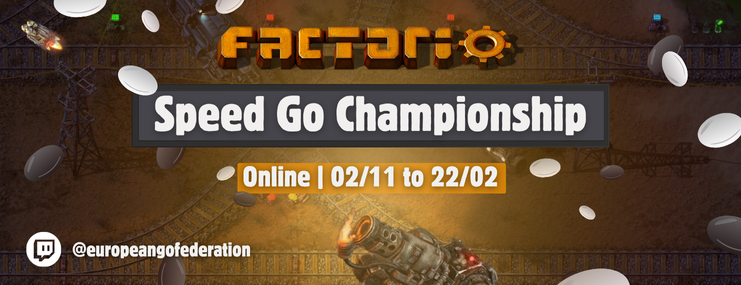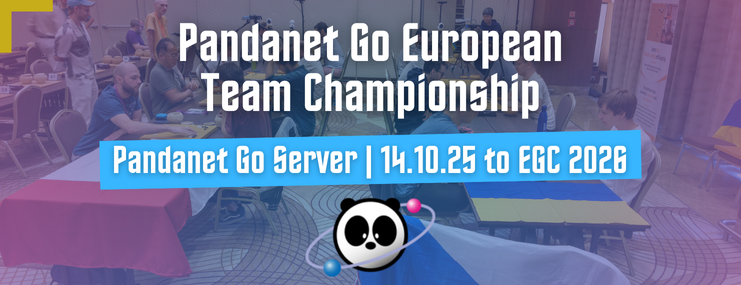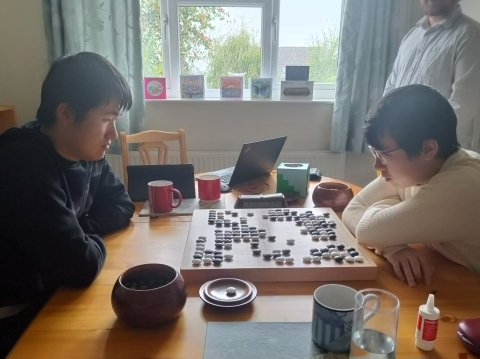We have often seen Yaoling on the podium of Major tournaments like the EGC or Paris Open, Prague Open...As for Damen, he's already been among the top UK players for many years and is representing UK in the Korea Prime Minister Cup this year (so this match was a good training).
Before we get into wild details about the games and so on...
...how is the British Championship organised?The British Championship first starts with the "Candidates'" tournament, in which players who meet the various qualification criteria can participate. The top two players in this tournament then face each-other in the British Go Championship best-of-three final match.
Now we can go
Let's kill the suspense already with a massive spoiler: after two intense games, Yaoling won by 2-0, thus becoming the new British Champion.As it turned out, all this this was an excellent excuse to approach both players and ask them about the games, themselves and what they think of the European Go scene. (hopefully to the great joy of the readers, right? don't be afraid to say it in the comments)
To increase the suspense of re-living these games live with both players, although you just learnt about the result, an extract from the BGA report by Ai Guan will be added, together with super photos.
Hi guys!
Yaoling, you have just won the British Championship at your first try, congratulations! It is a very serious tournament.
Could you tell us how you prepared for it and how you felt, when you sat in front of the title holder you had beaten in the qualifiers, Damen Woo, to play the decisive match?
YY: Thanks! I usually do not have specific preparations for tournaments, because I could usually maintain proficiency through playing and reviewing tournaments or online games. Entering the title match is something to happen as expected (because the 3-year residence requirements have excluded lots of strong players). Playing against Damen is exciting because we are quite familiar and I know he is super strong.
We've seen the games: why do you like fighting so much?
YY: Fighting makes the game more interesting and is what I’m used to. Fighting could usually give a clearer idea of who’s going to win, while peaceful games are hard to control in the endgame.
Wow, fair enough, that sounds like a legitimate reason for fighting.
Alright guys, some impressions from the first game?

"Returning from lunch, black went on the offensive where white had ignored his ko threat, and around move 100, black looked to be in a comfortable spot with a substantial moyo. But..."
YY: Both games were tough for me. I believe I led a lot in the beginning by killing a huge corner, while later I played kind of “traditional” to gave black super huge points in the middle after missing some creative AI moves (e.g. below diagram), and felt quite far behind. But I played almost perfectly in the endgame and luckily won by 0.5.

DW: I had a comfortable lead in points, but my groups were weak and some slow moves needed to be played to ensure their safety. I tried sacrificing some points to secure the win, but I may have sacrificed a bit too much. Yaoling’s endgame was nearly flawless, allowing him to edge out a 0.5-point victory.
At least you agree on the outcome...
In the second game, the situation was very tense and the game reversed in the end with the situation on the lower side.
"Damen steadily built up the pressure as the midgame progressed, and with move 164 white played the vital point to begin an attack on a black group that would lead to a ko. But..."
Damen, what was your thinking when you played this move and started the following sequence?

DW: At this point, I was fairly confident I was in the lead, though I suspected the margin was not as big as the AI indicated. I reckon that my lead is around 3 points. Instead of playing it safe, I decided to push for more. I released it would eventually lead to a ko fight, and I mistakenly believed that one ko threat would be sufficient. Unfortunately, I miscalculated, while Yaoling’s calculations were spot on.
Yaoling, what was, on your side, your reasoning throughout the game? You started with a move seen as rather unusual in modern go.
YY: Beginning with 5-4 recently appears in some Chinese professional games (while they will play 3-5 in the 5th move to secure the corner). I planned to give Damen a surprise but it turned out that he did that to me by playing 3-3 directly. It was then super tough that I felt behind almost throughout the game until later when Damen made the only mistake. I was a bit pessimistic so I tried to fight everywhere.

The fact that the game was super tensed was confirmed by Tim James and Ai Guan, scribes and referees for the games.. ;-)
Ai Guan: yes, we all knew that Yaoling had booked a train after the second game and we were worried that if the game lasted as long as the first day, then Yaoling would miss it. So we were all happy when the game seemed to be progressing faster. Then for move 128 Damen suddenly paused and thought and thought (I think maybe 20 minutes or more?). In-Seong and all the spectators [of the live stream] thought the next move was obvious, I was even asked if the recording was up to date... then Tim James simply messaged me "train tesuji".
What are you plans after your studies? Yaoling, will you stay in Europe, as you came for your studies?
DW: I am currently doing my PhD in Occupational Psychology at the University of Nottingham, and I am planning to stay in academia after graduating.
YY: I will go back to China to work probably after September 2025. I will really miss the Go journey in Europe, and I hope that I can still visit Europe and play some tournaments in my future life.
Of course, you will always be welcome! :)
Now now, Damen, will you prepare to regain the title?
DW: I will try my best. There are many good players in the UK, and the young generation is rising!
Actually, how did you both end up playing go in the first place? What did it bring you in your daily life?
DW: It happened by accident. I grew up with my aunt and grandma. During the summer holidays, there was no one to look after me at home. So, they placed me in a Go academy in Hong Kong for which there are players from beginner levels to 4d EGF that time. They did not expect me to enjoy Go, so they only paid the entry fee but did not pay for lessons, treating it like a nursery. I spent that summer holiday just watching people play Go.
YY: The decision to play go came from my grandparents when I was 6. Go has become the most valuable thing throughout my life, brought me lots of friends and joy, and in some sense also helped me develop calculation and logical thinking abilities in my daily life.
Ok, one last tough question for you guys. I declare the debate open!
In Europe it is quite obvious that the Go scene is nothing to compare with Asian ones. We have only one event with barely 1000 players – the EGC – and the rest is very small, the sponsorship for Go is poor and comes mainly from Asia, prizes are consequently small too, and the level is not as good as it could be (many people play go as a hobby and don’t train). In short, despite consistent efforts from the European community, our steps are very small, although improving.
Perhaps our mentality is also different, in the sense that the competition spirit is not shared by all the players.
What do you think of the European Go scene, in that regard? Do you think we should focus special efforts in a specific direction? (in a realistic way)
YY: I guess the priority is to increase the popularity of Go.
Europe could make go as an optional (sports) course in schools, or have more local Go schools (which can change the main source of learning Go from online to face-to-face). These could be done in collaboration with current local Go clubs.
Through cultural communications. Hikaru No Go is a good example. Having good movies, cartoons, TV series or books with Go as a main thread could attract more younger generations.
It is also important to improve the level of top European players, this could involve organizing top players to train in Asia (which I know already exist), or more practically, organizing strong Go camps in Europe with Asian professionals as coaches.
I completely believe there will be a bright future for the European Go community.
DW: I disagree with the notion that Asia is ahead of Europe in Go events, to certain extent, especially in the amateur circle. In Asia, many Go tournaments focus only on top players. Coming from Hong Kong, I have seen how different the Go scene is compared to China. China, along with Korea and Japan, has serious academies that train players to become professionals. However, in Hong Kong, even those who reach a high level in Go rarely consider becoming professional players. I believe that the amateur Go environment in Hong Kong is quite similar to Europe’s.
One area where I think Europe excels is its European Go Database, which encourages players to improve and gives them a clear sense of where they stand in their Go journey. Additionally, compared to Hong Kong, the Go community in Europe feels more welcoming and it is easy to make friends by participating in competitions and event. I truly believe Europe has done a great job in promoting Go, especially for kyu-level players, and encouraging new players to get involved. While the Go scene in Europe might not match the popularity of China, Korea, or Japan, its inclusiveness and friendliness make it stand out.
To address the question of serious Go training and reaching the top level, I believe European players may benefit from guidance from professional players from China and Korea. Honestly, I think the EGF had done a great job. I have heard that the EGF has sponsored players to study Go in China, like the pros or Lukas Podpera and other top Europeans. Perhaps sponsoring regular online Go lectures from strong professional players from China and Korea, specifically for top players, could be beneficial. Monthly sessions, for example, would not only help players to improve their skills but also maintain their enthusiasm.
Although I did not train at a professional Go academy, I have had lessons with professional players before. Often they do not need to tell you the exact moves to play, but through talking with them, they can help you release your weaknesses, and their insights can be quite eye-opening.
Thank you so much for these insights and sharing your experience with us! Good luck to you both in the upcoming tournaments!
A big thanks to Ai Guan from the British Go Association for the pictures and the detailed report of this championship, you can read here and find as well the games and the commentary by Inseong Hwang 8d.








